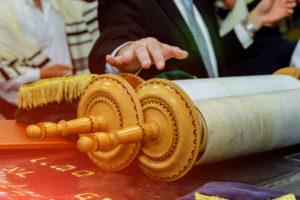
By Rabbi Jason Bonder
Parshat Vayera
In this week’s Torah portion, we find Abraham sitting at the opening of his tent. When he spots strangers in the distance, he displays the hospitality for which our tradition lauds him. Abraham rushes to greet them and offers them food, drink and more.
I often refer to this story when I officiate weddings because the open sides of the chuppah — the canopy under which a couple stands — can remind us of Abraham and Sarah’s tent. Tradition tells us that their tent was open on all sides, so that if strangers were passing by in any direction, Abraham and Sarah could see them and welcome them in.
Like the paths open to the three wanderers in the story, the paths of what to talk about from this week’s portion are numerous. We could focus on the identity of the angels. There is wordplay to make us wonder if they are men, angels or perhaps the Almighty in the crew of travelers. Another element ripe for interpretation is the message that these guests bring — that Abraham and Sara would have a son. This news is filled with beautiful insights and inspiration about infertility and parenthood.
All of these potential roads of interpretation, however, lead into the future — into the time after Abraham’s encounter with the strangers. Instead, I want to turn around and look at the path already traveled. It is important to remember where Abraham and Sarah came from if we want to fully appreciate their hospitality in the Torah portion.
Why does Abraham rush to greet the strangers? The Torah shows us that Abraham was able to see himself in these wanderers and so he was more inclined to help. This portion, Vayera, is asking us to remember last week’s portion, Lech Lecha, and the fact that Abraham and Sarah, too, were travelers. They, too, knew what it was like to make an arduous journey.
This idea that Abraham saw himself in these travelers sets the stage for a Jewish value that we will see repeatedly in our journey through Torah — the imperative to be kind to the stranger because we were once strangers in Egypt. Just as Abraham saw himself in the experiences of others, we are asked to see ourselves and our Jewish story in the other as well.
Another Jewish value that propels Abraham’s rush to help the strangers is the idea that we are created in the image of God. The Torah playfully makes us wonder, over many verses, who these people are that Abraham rushes to greet, and if they are mortal or divine. If it is true that Abraham rushes out there because he sees himself in them, then the fact that Abraham sees himself in the faces of Divine beings helps to echo the idea that we, humanity, are created in the image of God.
This idea that Abraham was spurred to action because of his ability to see himself in another, is very much influenced by an experience in my life. I am writing these words for this week’s dvar Torah from the airport in Phoenix. I am here because I will have the honor of co-officiating at the funeral of a dear teacher and colleague of mine, Rabbi Barton Lee, z”l.
My first job after rabbinical school was in Tempe, Arizona, and within a few weeks of starting, Lee, the emeritus rabbi at Arizona State Hillel, reached out to me. He invited me to his home. He invited me to study with him. And we developed a wonderful friendship.
During my three years in the desert, I can likely count on one hand the times when he was not waiting at the opening of his “tent,” eagerly waiting to greet me and welcome me into his home. Lee and his wife Marcie’s hospitality was like the hospitality of Abraham and Sarah. They always made me feel like an honored guest.
Four or so decades before I arrived in Tempe to start my rabbinic career, Lee arrived in Arizona to start his. I imagine that when I arrived, he recognized that my family and I were experiencing our “Lech Lecha” moment. And it spurred him to reach out.
Rabbi Barton Lee, like Abraham and Sarah, was able to recognize a shared experience with others. I am a better rabbi, and person, thanks to him and his hospitality. Each time I read of Abraham rushing to greet those strangers, I will surely think of Lee.
Rabbi Jason Bonder is the associate rabbi at Congregation Beth Or in Maple Glen. The Board of Rabbis of Greater Philadelphia is proud to provide diverse perspectives on Torah commentary for the Jewish Exponent. The opinions expressed in this column are the author’s own and do not reflect the view of the Board of Rabbis.





